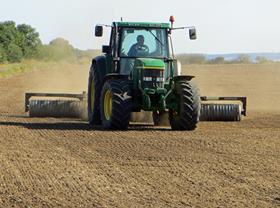
Agriculture now accounts for 10 per cent of UK greenhouse gas emissions according to the latest report by the Committee climate change committee report.
The report stated that deeper reductions in emissions are required if Britain was to meet its greenhouse gas emissions reduction strategy of 80 per cent decrease by 2050.
The report added that cost-effective reductions of agricultural emissions are not being delivered by government, saying there was a “major risk” that the 4.5 MtCO2e reduction by 2022 will not be achieved.
Excluding transport, agricultural greenhouse gas emissions were 46.5 MtCO2e in 2016, broadly unchanged from 2015. Emissions are 16% lower than in 1990, but there has been no progress in reducing emissions in this sector since 2008.
Almost half of all agricultural emissions, 47 per cent, are due to enteric fermentation arising (farting and burping) from the digestive process of cattle and sheep.
Agricultural soils accounts for a further 24% of emissions, 16% from managing waste and manure, and a further 10% from the running of stationary and mobile machinery.
The report called for a stronger framework to deliver emissions reduction, stating voluntary agreements may not be sufficient to meet reduction targets.
It also called for proposals outlined in the Clean Growth Strategy to become firm policies by 2020 as well as asking the government to ensure the £90million Challenge Fund is allocated to projects that deliver on GHG mitigation in agriculture.
There was some good news however, as waste emissions enjoyed a significant drop. Chairman of the report, Lord Debden, said: 'Emissions from waste are also down 48 per cent since 2008 – an unsung story, the outcome of EU regulation and the UK landfill tax.
'We should celebrate this progress,' he added, 'But it masks a worrying trend in other sectors.'






No comments yet